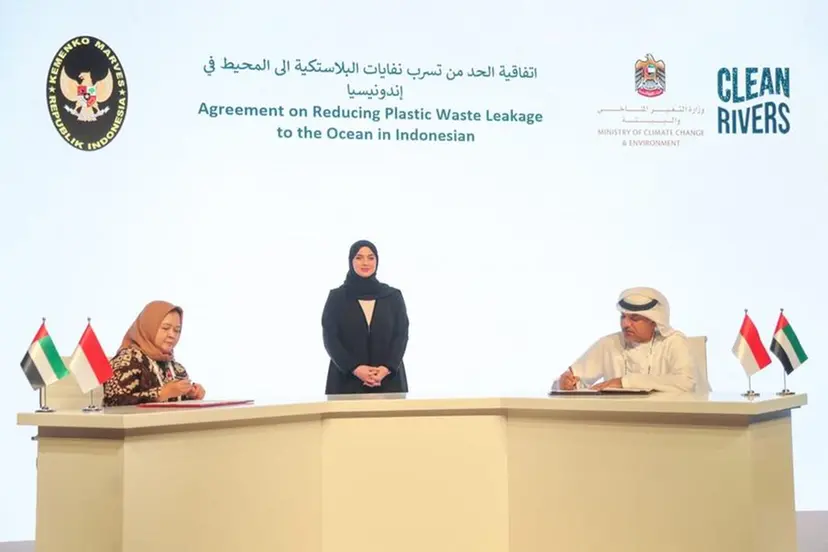The formal signing ceremony took place on the sidelines of The AVPN Global Conference 2024 in Abu Dhabi in the presence of Dr. Amna bint Abdullah Al Dahak Al Shamsi, Minister of Climate Change and the Environment, and Suhail bin Mohammed Al Mazrouei, Minister of Energy and Infrastructure
The Ministry of Climate Change and Environment (MOCCAE) today signed a Memorandum of Understanding (MoU) with the Ministry of Maritime Affairs and Investment of the Republic of Indonesia, to support the country in reducing plastic waste leakage into the oceans.
The formal signing ceremony took place on the sidelines of The AVPN Global Conference 2024 in Abu Dhabi in the presence of Dr. Amna bint Abdullah Al Dahak Al Shamsi, Minister of Climate Change and the Environment, and Suhail bin Mohammed Al Mazrouei, Minister of Energy and Infrastructure.
The MoU was signed by Mohammed Saeed Sultan Al Nuaimi, Under-Secretary of MOCCAE, and Nani Hendiarti, Deputy Coordinating Minister for Forestry and Environmental Management, Ministry of Maritime Affairs and Investment of the Republic of Indonesia.
The MoU builds on collaborative work between the two countries to deploy nature-based solutions to combat climate change challenges, including the Mangrove Alliance for Climate (MAC) and the MBZ-JKW International Mangrove Research Center. This agreement will set a framework for cooperation between the UAE and Indonesia to address the urgent environmental challenge of plastic waste leakage into the oceans around Indonesia.
During the event, Clean Rivers – a global non-profit based in Abu Dhabi, dedicated to addressing the challenge of river plastic pollution – was launched. It will serve as an official implementing partner of the MoU.
Al Nuaimi said, “I am proud of the collaborative spirit the UAE and Indonesia show in overcoming this huge challenge. Our two great countries have already made fantastic progress in deploying nature-based solutions to combat climate change. Our work together on the Mangrove Alliance for Climate (MAC) and the MBZ-JKW International Mangrove Research Center gives me great hope that this cooperation will be another of our success stories. The importance of this cooperation stems from the establishment of a joint commitment to the conservation of vital marine ecosystems between the two countries”.
He stressed that plastic pollution is one of the biggest threats and environmental pollutants and spreads in the oceans, rivers and environment, which has an adverse impact on people’s lives, pointing out that cooperation between the UAE and Indonesia opens the door for more efforts to preserve the environment and nature.
Al Nuaimi expressed his support for the launch of the Clean Rivers, which will play an important role in supporting global efforts in the plastic waste leakage into rivers and oceans in Indonesia and around the world.
Welcoming the MoU signing and launch of Clean Rivers, Butti Almheiri, Clean Rivers Board Member, said, “I am proud to announce the official launch of Clean Rivers and the MoU signed today embodies our commitment to reducing plastic waste and achieving cleaner oceans. As the implementing partner of this landmark agreement, Clean Rivers will deliver a truly transformative program to tackle riverine plastic pollution in Indonesia. I express my gratitude to both the Governments of the UAE and Indonesia for their support as we advance Clean Rivers’ global mission to empower riverine communities and innovate toward a cleaner world.”
The UAE and Indonesia will cooperate on a number of vital areas, including capacity building, increasing stakeholder awareness, and the design and delivery of economically sustainable circular waste systems. The MoU will also facilitate the productive exchange of information and best practices focusing on reducing the influx of plastic pollution into the ocean and expediting river clean-ups in Indonesia. The MoU also provides for the exchange of data, information, recommendations and best practices between two parties.
This significant moment also highlights the launch of Clean Rivers’ work to deliver transformative programmes that tackle plastic pollution in Indonesia. By acting as the catalyst for the creation of circular economies, Clean Rivers will help manage plastic waste, drive behavioural change and kindle local innovation. To achieve this, Clean Rivers today committed up to $20 million to initiatives in Indonesia that will prevent 300,000 tonnes of plastic waste from entering the ocean every year.
Clean Rivers will work in partnership with governments, local communities and private enterprises to drive comprehensive solutions to address the long- and short-term impacts of plastic pollution in rivers. This work will be undertaken with the specific objective of supporting the socioeconomic development of communities that live alongside some of the world’s most polluted waterways, such as in Indonesia.
Source: Zawya



